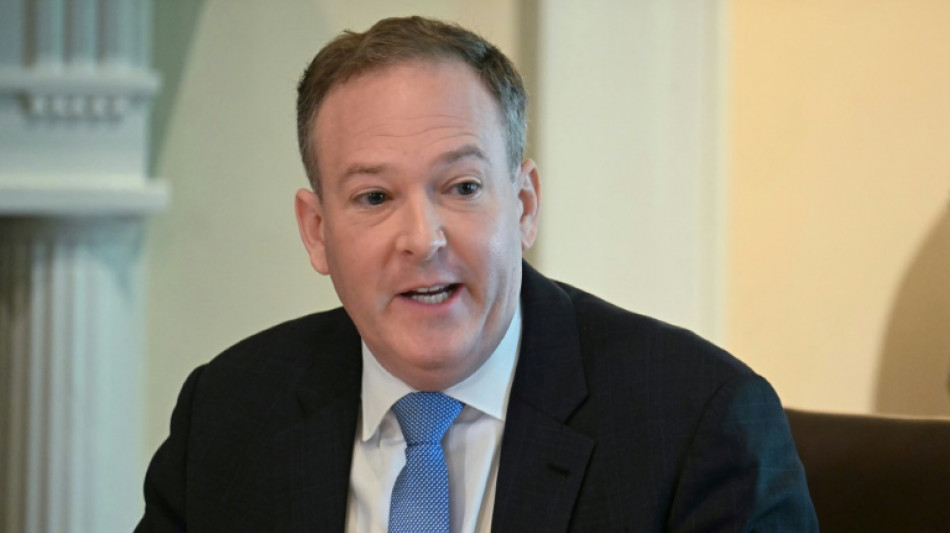
-
 McIlroy shares Riviera clubhouse lead as Rai charges, Scheffler fades
McIlroy shares Riviera clubhouse lead as Rai charges, Scheffler fades
-
Philippines' Duterte earned global infamy, praise at home

-
 Stocks drop, oil rises after Trump Iran threat
Stocks drop, oil rises after Trump Iran threat
-
As European heads roll from Epstein links, US fallout muted

-
 Families of Duterte's drug war victims eye Hague hearing hopefully
Families of Duterte's drug war victims eye Hague hearing hopefully
-
Russian decision is a betrayal: Ukrainian Paralympics chief

-
 Venezuela parliament unanimously approves amnesty law
Venezuela parliament unanimously approves amnesty law
-
Martinez missing as Inter limp to Lecce after Bodo/Glimt humbling

-
 India chases 'DeepSeek moment' with homegrown AI models
India chases 'DeepSeek moment' with homegrown AI models
-
World leaders to declare shared stance on AI at India summit

-
 'Everything was removed': Gambians share pain with FGM ban in balance
'Everything was removed': Gambians share pain with FGM ban in balance
-
Kim Jong Un opens rare party congress in North Korea

-
 Ex-Philippine leader Duterte faces pre-trial ICC hearing
Ex-Philippine leader Duterte faces pre-trial ICC hearing
-
Japanese star Sakamoto 'frustrated' at missing Olympic skating gold

-
 Japan inflation eases in welcome news for Takaichi
Japan inflation eases in welcome news for Takaichi
-
FIFA to lead $75m Palestinian soccer rebuilding fund

-
 Chicago Bears take key step in proposed Indiana stadium move
Chicago Bears take key step in proposed Indiana stadium move
-
Liu captures Olympic figure skating gold as US seal hockey glory

-
 North Korea opens key party congress
North Korea opens key party congress
-
Los Angeles sues Roblox over child exploitation claim

-
 Golden Liu puts US women back on top of Olympic women's figure skating
Golden Liu puts US women back on top of Olympic women's figure skating
-
Hodgkinson sets women's 800m world indoor record

-
 USA's Alysa Liu wins Olympic women's figure skating gold
USA's Alysa Liu wins Olympic women's figure skating gold
-
Man Utd cruise into Women's Champions League quarters

-
 Gu reaches Olympic halfpipe final after horror crash mars qualifiers
Gu reaches Olympic halfpipe final after horror crash mars qualifiers
-
Keller overtime strike gives USA Olympic women's ice hockey gold

-
 NASA delivers harsh assessment of botched Boeing Starliner test flight
NASA delivers harsh assessment of botched Boeing Starliner test flight
-
US Fed Governor Miran scales back call for rate cuts this year

-
 Gu qualifies for Olympic halfpipe final marred by horror crash
Gu qualifies for Olympic halfpipe final marred by horror crash
-
Trump issues Iran with ultimatum as US ramps up military presence

-
 Peru's brand-new president under fire for child sex comments
Peru's brand-new president under fire for child sex comments
-
UK police hold ex-prince Andrew for hours in unprecedented blow

-
 Former Olympic freeski halfpipe champion Sharpe crashes heavily
Former Olympic freeski halfpipe champion Sharpe crashes heavily
-
Former Olympic champion Sharpe suffers heavy halfpipe crash

-
 Belarus says US failed to issue visas for 'Board of Peace' meeting
Belarus says US failed to issue visas for 'Board of Peace' meeting
-
Forest boss Pereira makes perfect start with Fenerbahce rout in Europa play-offs

-
 Alcaraz fights back to book last four berth in Qatar
Alcaraz fights back to book last four berth in Qatar
-
England captain Itoje warns of 'corrosive' social media after abuse of Ireland's Edogbo

-
 War-weary Sudanese celebrate as Ramadan returns to Khartoum
War-weary Sudanese celebrate as Ramadan returns to Khartoum
-
Townsend expects recalled Scotland duo to shine in Six Nations clash with Wales

-
 Peru's new president under fire for child sex comments
Peru's new president under fire for child sex comments
-
UK king opens London fashion week despite brother's arrest

-
 Belarus frees opposition politician Statkevich
Belarus frees opposition politician Statkevich
-
Striking Argentine workers slow down Buenos Aires in protest over labor reforms

-
 Starlink loss a blow to Russian forces in Ukraine: experts
Starlink loss a blow to Russian forces in Ukraine: experts
-
UN's Sudan probe finds 'hallmarks of genocide' in El-Fasher

-
 Belarus frees opposition politician Statkevich: wife
Belarus frees opposition politician Statkevich: wife
-
Rocket re-entry pollution measured in atmosphere for first time

-
 Airbus ready to build two new European fighters if countries want
Airbus ready to build two new European fighters if countries want
-
Canada makes push to attract skilled migrants, including for defence


Trump administration expected to say greenhouse gases aren't harmful
President Donald Trump's administration is preparing to upend a foundational scientific determination about the harms of greenhouse gases that underpins the US government's ability to curb climate change.
A proposal from the Environmental Protection Agency (EPA) to change the so-called "Endangerment Finding" was sent to the White House on June 30, a spokesperson told AFP.
An announcement is expected imminently. Here's what to know -- and what's at stake if the finding is overturned.
- What is the Endangerment Finding? -
The Clean Air Act of 1970 empowered the EPA to regulate "air pollution which may reasonably be anticipated to endanger public health or welfare."
For decades, the law applied to pollutants like lead, ozone and soot.
But as climate science around the dangers of heat-trapping greenhouse gases advanced in the 2000s, a coalition of states and nonprofit groups petitioned the EPA to include them under the law, focusing on motor vehicles.
The issue reached the Supreme Court, which in 2007 ruled that greenhouse gases qualify as air pollutants and directed the EPA to revisit its stance.
That led to the 2009 Endangerment Finding, which declared greenhouse gases a threat to public health and welfare, based on overwhelming scientific consensus and peer-reviewed research.
"That 2009 finding formed the basis for all of EPA's subsequent regulations," Meredith Hankins, a senior attorney on climate and energy for the activist Natural Resources Defense Council, told AFP.
"They've issued greenhouse gas standards for tailpipe emissions from motor vehicles, smokestack emissions from power plants -- all of these individual rulemakings trace themselves back to the 2009 Endangerment Finding."
- What is the Trump administration doing? -
The Endangerment Finding has withstood multiple legal challenges, and although Trump's first administration considered reversing it, they ultimately held back.
But the finding is now a direct target of Project 2025, a far-right governance blueprint closely followed by the administration.
In March, the EPA under Administrator Lee Zeldin announced a formal reconsideration of the finding.
"The Trump Administration will not sacrifice national prosperity, energy security, and the freedom of our people for an agenda that throttles our industries, our mobility, and our consumer choice while benefiting adversaries overseas," he said.
The government is expected to undo the earlier finding that greenhouse gases endanger public welfare.
It will argue that the economic costs of regulation have been undervalued -- and downplay the role of US motor vehicle emissions in climate change.
In fact, transportation is the largest source of US greenhouse gas emissions.
"If vehicle emissions don't pass muster as a contribution to climate change, it's hard to imagine what would," Dena Adler of the Institute for Policy Integrity at New York University told AFP.
"It's fatalistic to avoid taking the many actions that could cumulatively fix climate change, because none of them can individually solve the entire problem."
Since 1970, the United States has emitted more vehicle-based greenhouse gases than the next nine countries combined, according to an analysis by the Institute for Policy Integrity that will soon be published in full.
- Could they succeed? -
In March, the EPA said it would lean on recent court rulings, including a landmark 2024 decision that narrowed federal regulatory power.
Still, legal experts say the administration faces an uphill battle.
"It will take a few years for the rule to be finalized and wind its way up to the Supreme Court for review," said Adler.
"If EPA loses before the Supreme Court, it gets sent back, and EPA then gets it back to the drawing board" -- by which time Trump's term may be nearing its end.
To succeed, the high court may need to overturn its own 2007 decision that led to the Endangerment Finding.
None of the justices who wrote the majority opinion remain on the bench, while three dissenters -- John Roberts, Clarence Thomas, and Samuel Alito -- still serve, and could spearhead a drive to upend the original ruling.
Even then, market forces may blunt the impact of any rollback.
"Utilities making long-term investments and companies purchasing capital goods expected to be used for decades won't base those decisions on short-term policy changes," said John Tobin-de la Puente, a professor at Cornell University's business school.
That's especially true when those swings run counter to business trends and could be undone by a future administration, he added.
P.Martin--AMWN



